
npj Computational Materials
Scope & Guideline
Advancing the Future of Materials Science.
Introduction
Aims and Scopes
- Materials Discovery and Design:
The journal prioritizes studies that leverage computational techniques, including machine learning and high-throughput screening, to discover and design new materials with desired properties. - Computational Modeling and Simulation:
A significant aspect of the journal's scope includes the development of theoretical frameworks and computational models to simulate material behaviors at various scales, from atomic to macroscopic. - Interdisciplinary Approaches:
Research that integrates insights from physics, chemistry, and engineering to address complex materials problems is prominently featured, highlighting the collaborative nature of modern materials science. - Machine Learning and AI Applications:
The journal showcases innovative applications of machine learning and artificial intelligence in materials research, emphasizing their role in enhancing predictive modeling and optimization of materials properties. - Experimental and Theoretical Synergy:
Papers that bridge experimental investigations with computational predictions are encouraged, fostering a comprehensive understanding of materials phenomena.
Trending and Emerging
- Machine Learning and Data-Driven Approaches:
There is a significant increase in research focused on machine learning and data-driven methodologies to predict materials properties, optimize structures, and accelerate discovery processes. - High-Throughput Computational Screening:
The trend towards high-throughput computational screening of materials has gained momentum, allowing for rapid evaluation of vast materials databases to identify promising candidates for various applications. - Quantum Computing Applications in Materials Science:
Emerging interest in applying quantum computing techniques to solve complex materials problems is evident, with studies exploring quantum simulations to enhance computational capabilities. - Integration of Experimental Data with Computational Models:
An increasing number of papers are focusing on integrating experimental data with computational models to validate predictions and refine material design strategies. - Multiscale Modeling Approaches:
Research employing multiscale modeling approaches that connect atomic-level simulations with continuum mechanics is on the rise, reflecting a holistic view of materials behavior across different scales.
Declining or Waning
- Traditional Analytical Methods:
There has been a noticeable decrease in the publication of studies relying solely on traditional analytical methods without computational integration, as the field increasingly favors computational approaches. - Classical Molecular Dynamics Simulations:
The prevalence of classical molecular dynamics simulations has diminished as more researchers adopt advanced techniques like machine learning-driven simulations that offer improved accuracy and efficiency. - Empirical Potentials:
Research utilizing empirical potentials for materials modeling is becoming less frequent, with a shift towards data-driven and machine learning-based approaches that provide greater adaptability and precision.
Similar Journals
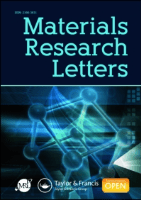
Materials Research Letters
Catalyzing Progress in the Materials Science CommunityMaterials Research Letters, published by Taylor & Francis Inc., serves as a leading platform in the field of materials science, offering an open access format to enhance global research dissemination since 2013. With an impressive impact factor and ranking in the Q1 category for miscellaneous materials science, this journal ranks #57 out of 463 in the Scopus materials science categories, placing it within the 87th percentile among its peers. The journal aims to provide rapid publication of short communications that report on significant findings in all areas of materials research, thus fostering innovation and collaboration among scholars, professionals, and students alike. As a primary conduit for cutting-edge research and developments in materials science, Materials Research Letters is essential for those seeking to stay at the forefront of this dynamic field.
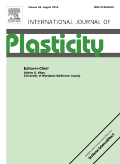
INTERNATIONAL JOURNAL OF PLASTICITY
Charting New Territories in Plasticity ExplorationINTERNATIONAL JOURNAL OF PLASTICITY, published by Pergamon-Elsevier Science Ltd, stands as a pivotal forum in the field of materials science and engineering, exploring the nuances of plastic behavior in materials. With its ISSN 0749-6419 and E-ISSN 1879-2154, this esteemed journal has been a cornerstone of academic research since its inception in 1985, continuing to hold significant relevance as it converges towards 2024. Ranking in the Q1 quartile across multiple categories, including Materials Science (Miscellaneous), Mechanical Engineering, and Mechanics of Materials, it is recognized for its high impact, evidenced by its competitive Scopus rankings that place it in the 97th percentile among mechanical engineering journals. Although it does not offer open access, the journal remains committed to disseminating cutting-edge research findings that advance understanding in plasticity, providing researchers, professionals, and students with vital insights into contemporary issues and innovations in the field.
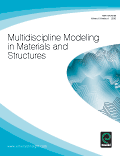
Multidiscipline Modeling in Materials and Structures
Innovating the future of materials science and engineering.Multidiscipline Modeling in Materials and Structures, published by EMERALD GROUP PUBLISHING LTD, serves as a vital platform at the intersection of diverse fields including materials science, mechanical engineering, and modeling and simulation. Since its inception in 2005, this journal has gained recognition for its commitment to advancing knowledge and innovation within these disciplines, boasting a commendable Q3 categorization across multiple fields as of 2023. With a robust Scopus ranking that places it in the top 60th percentile for both mechanical engineering and mechanics of materials, it stands as a credible source for researchers and practitioners seeking to stay informed on the latest methodologies and applications. The journal emphasizes the importance of collaborative approaches to complex problems in materials and structural analysis, aiming to foster interdisciplinary dialogue and generate impactful research outcomes. Although currently not open access, the journal offers subscription options that ensure access to cutting-edge studies and critical reviews relevant to professionals and students alike. Engaging with this journal not only enriches one’s understanding of the field but also contributes to the ongoing discourse and development of innovative solutions in materials and structural modeling.

Integrating Materials and Manufacturing Innovation
Transforming Ideas into Advanced Manufacturing Practices.Integrating Materials and Manufacturing Innovation, published by SPRINGER HEIDELBERG, is a leading journal in the fields of Industrial and Manufacturing Engineering and Materials Science. Since its inception in 2012, this journal has established itself as a pivotal platform for disseminating cutting-edge research that bridges the gap between materials science and advanced manufacturing practices. With an impressive impact factor and consistent ranking within the Q1 and Q2 quartiles, it serves as an essential resource for academics and professionals alike, fostering innovation and collaboration in the industry. The journal aims to publish high-quality original research, reviews, and case studies that address contemporary challenges and advancements in materials and manufacturing integration. Researchers, students, and industry experts seeking to stay at the forefront of their fields will find this journal an invaluable addition to their academic and professional libraries.
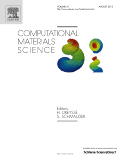
COMPUTATIONAL MATERIALS SCIENCE
Unlocking the Secrets of Materials with Computational TechniquesCOMPUTATIONAL MATERIALS SCIENCE is a prestigious academic journal dedicated to the dissemination of innovative research in the field of computational materials science, emphasizing the interplay between computational methodologies and materials engineering. Published by ELSEVIER in the Netherlands, this journal showcases high-impact articles that contribute significantly to the understanding of material properties through computational techniques. As evidenced by its 2023 Scopus Rankings, which place it in the top quartiles across multiple disciplines including Computer Science, Materials Science, and Physics and Astronomy, it is a vital resource for researchers, professionals, and students alike. With a focus on advancing scientific knowledge and practical applications, COMPUTATIONAL MATERIALS SCIENCE aims to bridge the gap between theoretical investigations and experimental validation. Explore a wealth of cutting-edge research designed to inspire the next generation of innovations in materials science through this esteemed publication.
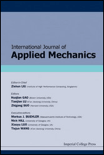
International Journal of Applied Mechanics
Pioneering Research for a Dynamic Engineering LandscapeThe International Journal of Applied Mechanics, published by World Scientific Publishing Co Pte Ltd, is a premier platform that serves the fields of materials science, mechanical engineering, and mechanics of materials. Located in Singapore, this journal has established itself as a crucial resource for researchers, professionals, and students, with its convergence of scholarly work from 2009 to 2024. Ranked in the Q2 category across notable disciplines, including Materials Science, Mechanical Engineering, and Mechanics of Materials, it reflects a strong commitment to publishing high-quality research that pushes the boundaries of knowledge in applied mechanics. Despite being a non-open access journal, its successful Scopus rankings, including an impressive rank of #151 in Mechanical Engineering, signify its substantial impact and recognition within the academic community. This journal not only aims to disseminate pioneering research but also to foster collaboration and innovation in the rapidly evolving landscape of applied mechanics.
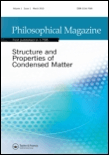
PHILOSOPHICAL MAGAZINE
Cultivating Knowledge in Condensed Matter SystemsPHILOSOPHICAL MAGAZINE, published by Taylor & Francis Ltd, is a distinguished journal that focuses on the field of Condensed Matter Physics. With an ISSN of 1478-6435 and an E-ISSN of 1478-6443, this journal serves as a vital platform for researchers and professionals seeking to disseminate and access cutting-edge research and developments in the field. Currently ranked in the Q3 category within its discipline according to the 2023 quartiles, and positioned at the 45th percentile in Scopus rankings, PHILOSOPHICAL MAGAZINE is recognized for its significant contributions to theoretical and experimental physics. The journal embraces open access options, enhancing its reach and accessibility to a global audience. With coverage spanning from 2003 through 2024, it remains a cornerstone for scholars and students who aim to deepen their understanding of the complexities within condensed matter systems. For anyone engaged in the physical sciences, PHILOSOPHICAL MAGAZINE offers invaluable insights and fosters an environment of rigorous academic inquiry.

Frontiers of Structural and Civil Engineering
Exploring New Frontiers in Architectural ExcellenceFrontiers of Structural and Civil Engineering, published by HIGHER EDUCATION PRESS, is a premier academic journal dedicated to advancing the fields of architecture, civil, and structural engineering. With an ISSN of 2095-2430 and E-ISSN of 2095-2449, this journal caters to the dissemination of high-quality research and innovative practices from 2012 onwards, highlighting important developments up until 2024. Ranked in the top quartile (Q1) for Architecture and Q2 for Civil and Structural Engineering in 2023, it holds an impressive Scopus ranking of #19 out of 189 in Architecture and #101 out of 379 in Civil and Structural Engineering, reflecting its impact and relevance in the scientific community. This journal invites contributions that demonstrate pioneering approaches, fostering collaboration among researchers, professionals, and students alike, and significantly contributes to the global knowledge base in the engineering disciplines.

Multiscale and Multidisciplinary Modeling Experiments and Design
Innovating the future of experimental design through collaborative insights.Multiscale and Multidisciplinary Modeling Experiments and Design is a dynamic journal published by SPRINGERNATURE, dedicated to advancing the fields of applied mathematics, materials science, and mechanics of materials. With an ISSN of 2520-8160 and an E-ISSN of 2520-8179, this journal provides a platform for innovative research and multidisciplinary approaches that address complex modeling and experimental challenges from 2018 to 2024. Ranked in the Q3 quartile across its categories and holding respectable positions within Scopus rankings, it serves as a vital resource for researchers and professionals seeking to explore emerging techniques and solutions in their fields. Despite its recent inception, Multiscale and Multidisciplinary Modeling Experiments and Design fosters a collaborative environment for knowledge exchange, making it essential for anyone at the forefront of scientific discovery. Open access availability ensures that the groundbreaking research published within is accessible to a broad audience, promoting global collaboration and innovations.

Frontiers in Materials
Empowering Knowledge Exchange in Materials Science.Frontiers in Materials, an esteemed journal published by FRONTIERS MEDIA SA, is a leading platform in the field of Materials Science, with a notable impact factor placing it in the Q2 category of its discipline as of 2023. Since its establishment as an Open Access journal in 2014, it has fostered considerable academic exchange, allowing researchers from around the globe to share their innovative findings and insights. Based in Lausanne, Switzerland, this journal not only emphasizes high-quality peer-reviewed articles but also prioritizes rapid dissemination of research, as evidenced by its commendable Scopus ranking of #62 out of 196 in Materials Science (miscellaneous). By consistently striving to bridge the gap between academia and practical applications, Frontiers in Materials serves as an invaluable resource for researchers, professionals, and students seeking to delve into cutting-edge advancements and transformative applications in materials science.